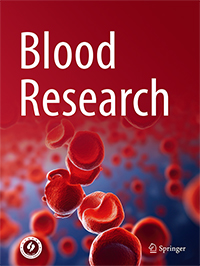Korean J Hematol 1990; 25(2):
Published online June 30, 1990
© The Korean Society of Hematology
Interferon α2a에 의한 골수 이형성 증후군의 성공적 치료
전재범, 장정순, 정태준, 이영열, 김인순, 최일영
한양대학교 의과대학 내과학교실
A Successful Treatment of Myelodysplastic Syndrome with Interferon-α2 a
The myelodysplastic syndromes, MDS., like the leukemias amd myeloproliferative syndrome, are clonal disorders of the bone marrow, characterized by progressive refractory cytopenia with cellular dysfunction and defective myeloid maturation involving at least two and generally three hematopoietic cell lines.
Clonal chromosomal abnormalities similar to those seen in acute nonlymphocytic leukemia are found in 50% of cases, supporting the view that MDS, like acute nonlymphocytic leukemia, is a clonal malignancy of hematopoietic stem cells.
While 10% to 40% of patient with MDS might eventually develop acute leukemia, approximately 20% to 40% will die from infection and/or bleeding.
Supportive therapy with transfusion of RBCs and platelets has been the mainstay of therapy, while treatment with cytotoxic or differentiation-inducing agents, eg, low-dose
cytosine-arabinoside, vit D3, retinoic acid, or interferon- alpha and gamma, has been only partly successful.
α-interferon would seem to offer therapeutic potential for a number of reasons.
First, αINF is known to suppress both normal and CGL myeloid proliferation and to induce differentiation of certain myeloid cell line - both effects are of potential benefit in MDS.
Second, MDS, like hairy - cell leukemia, may occasionally improve after infection raising the possibility that a cytokine- mediated mechanism is involved. Finally, several
studies have demonstrated defective NK function in MDS : α IFN is known to be a potent stimulator of NK function and might thereby modify disease activity. We experienced a case of myelodysplastic syndrome in a 32-year-old male patient who was treated successfully with interferon-α2a and report this case with a review of the literatures.
Keywords Myelodysplastic syndrome; α-interferon;
Article
Korean J Hematol 1990; 25(2): 359-366
Published online June 30, 1990
Copyright © The Korean Society of Hematology.
Interferon α2a에 의한 골수 이형성 증후군의 성공적 치료
전재범, 장정순, 정태준, 이영열, 김인순, 최일영
한양대학교 의과대학 내과학교실
A Successful Treatment of Myelodysplastic Syndrome with Interferon-α2 a
Jae Bum Jun, Joung Soon Jang, Tae Joon Chung, Young Yiul Lee, In Soon Kim, Il Young Choi
Department of Internal Medicine, College of Medicine, Hanyang University, Seoul, Korea
Abstract
The myelodysplastic syndromes, MDS., like the leukemias amd myeloproliferative syndrome, are clonal disorders of the bone marrow, characterized by progressive refractory cytopenia with cellular dysfunction and defective myeloid maturation involving at least two and generally three hematopoietic cell lines.
Clonal chromosomal abnormalities similar to those seen in acute nonlymphocytic leukemia are found in 50% of cases, supporting the view that MDS, like acute nonlymphocytic leukemia, is a clonal malignancy of hematopoietic stem cells.
While 10% to 40% of patient with MDS might eventually develop acute leukemia, approximately 20% to 40% will die from infection and/or bleeding.
Supportive therapy with transfusion of RBCs and platelets has been the mainstay of therapy, while treatment with cytotoxic or differentiation-inducing agents, eg, low-dose
cytosine-arabinoside, vit D3, retinoic acid, or interferon- alpha and gamma, has been only partly successful.
α-interferon would seem to offer therapeutic potential for a number of reasons.
First, αINF is known to suppress both normal and CGL myeloid proliferation and to induce differentiation of certain myeloid cell line - both effects are of potential benefit in MDS.
Second, MDS, like hairy - cell leukemia, may occasionally improve after infection raising the possibility that a cytokine- mediated mechanism is involved. Finally, several
studies have demonstrated defective NK function in MDS : α IFN is known to be a potent stimulator of NK function and might thereby modify disease activity. We experienced a case of myelodysplastic syndrome in a 32-year-old male patient who was treated successfully with interferon-α2a and report this case with a review of the literatures.
Keywords: Myelodysplastic syndrome, α-interferon,





 PDF
PDF Standard view
Standard view Export citation
Export citation Share
Share  Previous Article
Previous Article



